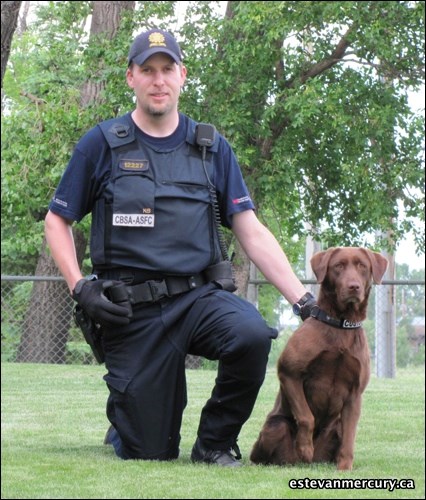The Canada Border Service Agency has apparently had a change of heart with regards to the dog detector service at the North Portal Border Crossing.
The Mercury was informed last week by Souris-Moose Mountain MP Ed Komarnicki and others that the service, which is made up of handler, Toban Tisdale, and Holly, was to be restored.
As was reported May 9, the move was part of the CBSA's first round of cuts after they were ordered by the federal government to trim their budget by $143 million over the next three years. In all, 19 dog and handler teams were initially cut across the country.
Once word of the cuts became public, a number of area residents, spurred on by a poster campaign started by Pat and Sam Dzuba of Roche Percee, began calling Komarnicki's office to voice their displeasure with losing the only detector service in Saskatchewan. Komarnicki jumped on the issue and contacted the minister responsible for CBSA and came away from the conversation confident the service might be spared. Although an official announcement was not made by the CBSA, word of the news began to circulate May 8.
Brea Lewis, president of Saskatchewan branch of the Canadian Immigration Union, said as of Friday they had not received official notification from the CBSA but was excited at the likelihood that Tisdale and Holly would remain on the job.
"It's important for the entire province," Lewis said. "When we do have issues we at least know that there is a dog there that we can call upon. One of the cuts announced was also a reduction in travel budgets, so even if we did need someone, we needed to justify it to be able to call them out of Coots (Alberta)."
Lewis added the CIU is working to get the other 18 dog and handler teams that were cut reinstated and feels the North Portal decision is a positive step in that regard.
"This is definitely a step in the right direction," she said. "(The article in last week's Mercury) has already hit Montreal. I've gotten e-mails from some of the union presidents out there saying they have seen the article and it's just one step towards helping us get our dogs restored out here."
Lewis said from the moment the cuts were announced, the CIU has been questioning the decision, especially with the CBSA making public comments that they wanted to increase border security. The cutting of Tisdale and Holly also came at a curious time on a local level as there have been numerous reports of an increase in crime along the border.
"Then they go and take away one of the quickest and fastest tools that we have for the elimination of drugs and firearms and currency as well. It totally took all of us by surprise."
Lewis said the CIU was also taken aback by the announcement that five intelligence officer positions, including one in Estevan, would be cut at this time. They are also working to get those positions restored.
"The federal government of the day has said they want to go to more of an intelligence-led agency which is in-line with every other police agency and border agency and then they go and announce a reduction in the intelligence officers. It took us completely by surprise where they were announcing the cuts. It was definitely not where we were expecting."
Lewis added the CIU is also fearful of what the future holds as this is just the first year of cuts. One major area of concern is the possible automation of crossings, which are deemed as small by the federal government.
"According to Ottawa, every port in Saskatchewan other than North Portal is considered small. That is a grave concern for us."
In response to repeated requests for an interview, the CBSA sent an e-mail response to The Mercury Thursday. In it, the CBSA said they are confident the cuts will be carried out with minimal negative impacts to the public and their employees.
"The CBSA remains unwavering in its commitment to deliver its mandate of protecting Canadians and facilitating travel and trade. The health and safety of Canadians will not be compromised through the implementation of any of these budget reduction initiatives," the e-mail said. "The CBSA remains committed to its relationship with domestic and international partners, and will continue to collaborate and liaise with them regularly."
With respect to detector dogs, the e-mail indicated that although dogs are effective in some areas and environments, there are areas where other methods have proven more successful.
"The intent of the savings measure is to eliminate DDS teams particularly where there are other options in place that have proven to be more effective, multiple teams and/or lower risk locations. Of note, the detector dog team at the North Portal Port of Entry is not affected as part of the deficit reduction action plan nor are drug or firearm detector dog teams at any other land ports of entry."




